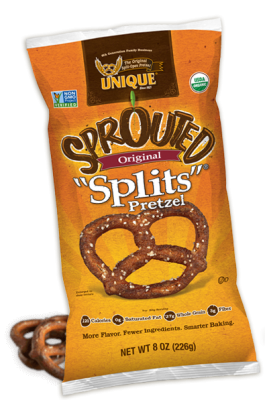Has sprouted wheat flour caught your eye on supermarket shelves? What is it, who should eat it, and how can it be more nutritious than un-sprouted flour?
Sprouted grains, such as wheat, barley, spelt, corn, rice, oats, sorghum, rye, millet and others, are quickly making their way into food products and into the diets of people seeking better nutrition and improved digestion.

Unique Pretzels, for example, are made with organic sprouted 100% whole wheat flour made by Essential Eating® Sprouted Foods. They are the only sprouted flour pretzel snacks in mass production as well as the first to be made with healthier organic extra virgin olive oil.
What Are Sprouted Grains?
“Whole grains” are actually the dormant seeds of plants, primarily cereal grasses. They are considered “whole” when they contain all of the naturally occurring edible parts of the grain seed – the bran, germ, and endosperm.
Like any other plant seed, these seeds have the potential to germinate (sprout), to break through their outer bran layer, and grow into new plants when subjected to the right temperatures and moisture conditions.
In the short period of time between when the seeds sprout and when they develop into plants, they are regarded as “sprouted grains.” The young sprout fuels its growth by digesting some of the starch in the grain. The starch molecules are converted to simple sugars (which are considered vegetables), making them easier to digest, and the ratio of other nutrients, such as proteins, vitamins, and minerals, increases.
The sprouting process causes enzymes to be released that break down proteins and carbohydrates in the grains. Their Low Glycemic Index makes them diabetic-friendly, and they may also benefit people with mild sensitivities to wheat. However, sprouted grains still contain gluten.
Are All Sprouted Grain Products the Same?
The short answer is no. Until recently, most sprouted products have been made by a wet-milling or “mash” process. The grains are soaked (sometimes drowned), and may not actually have sprouted. They are not sifted or milled into flour, but are ground into a paste for baking (and the products are called “flourless”). Mash products are coarser in texture, bitter, and may contain parts of the broken up bran and foreign matter.
Newer processes, such as the one used by Essential Eating, involve rinsing, drying, sifting and milling the sprouted grain into 100% whole grain flour that has great baking characteristics and no bitterness.
Turning whole sprouted grains into flour instead of mash allows them to be:
- rinsed to remove and reduce bacteria for better taste
- tested to guarantee sprout action for better digestion
- dried to stabilize and extend shelf life
- sifted to remove foreign matter
- milled to produce smooth-textured, great tasting product that is 100% whole grain
Unfortunately, there is no official definition of “sprouted grain,” and food packaging is not regulated, but you can read more about industry standards at the website of the Whole Grains Council.
Rest assured that the Sprouted “Splits” and Sprouted Shells from Unique Pretzels are made with premium sprouted wheat flour from Essential Eating, not from sprouted mash. They are GMO-free, have no additives, and have great flavor and texture. Visit our online store to order yours today or look for them at your local Wegmans, Fresh Market, Whole Foods or Giant stores.
